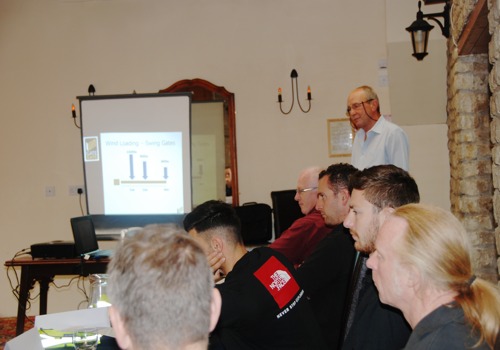For the majority of us, embarking on a training course represents a significant investment, both in terms of time and monetary outlay. To justify this cost, the business should first question what the objectives are for attending the course.
In terms of a training programme designed to improve awareness of the requirements to deliver a safe and compliant installation, the end goal must surely be to educate the delegate on the key factors influencing the overall safety in simplified terms making it easy to understand – and recall? Too much theory and jargon is lost on the average installer who is used to a practical, hands-on approach rather than poring over the theory. He/ she is therefore unlikely to retain information supplied in a language which is alien to them. After all, if you don’t understand what is being taught, how can you put that into practice?
When you are referring to a course that relates to gate safety, constant referrals back to the EU Standards rather than explaining what those standards actually mean is pointless. How many installers in the UK retain a copy of the standards within the company? And as we know, total compliance with the standards does not necessarily deliver a safe gate. The only way to achieve this is to undertake a risk assessment on the individual gate.
Expecting a small business to take too much time away from the revenue generating ‘day job’ is a big ask. Even more so if you have to cough up just under £500 to attend. £500 which can easily become an even bigger cost once you factor in travelling to a far-off destination and the potential need to pay for someone to ‘man’ the office whilst you are away.
Regardless of the cost of the training per se, the delegate must feel that they are taking a course which has been independently audited to validate its relevance / credibility. If the training lacks any kind of authentication, how can you be sure that the content and training methodology is in line with best practice – and equally important, that it is truly independent. Running a training course on the premises of a provider involved in the gate automation industry hardly lends itself to a genuinely neutral biased learning environment.
So, think about it, which automated gate training ticks the following boxes?
- Half-day awareness building course
- Emphasis on practical learning / praised for its delivery in ‘plain English’
- Focus on a risk-assessment led approach to gate safety
- Runs every month in a variety of locations across the UK so easy to find a course near you
- Accredited by IOSH, the world’s biggest professional health and safety membership organisation
- Hosted either by Trade Skills 4 U, the UK’s largest provider of electrical training or held in a neutral hotel setting
- Handy reference manual and access to ongoing support
- Costs just £244+VAT per person
